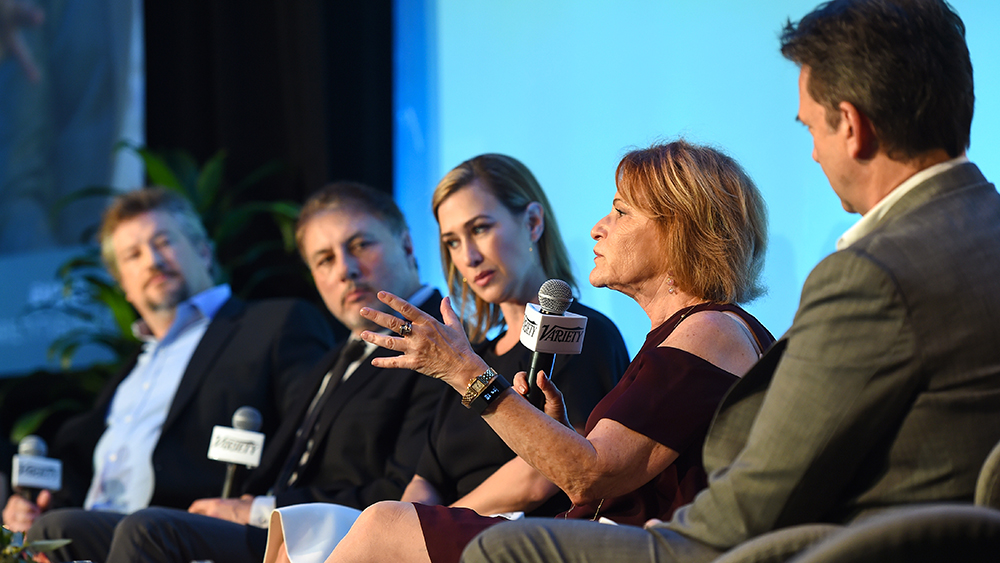CBS, Showtime, Paramount Execs Talk AT&T-Time Warner, ‘Roseanne’
By Daniel Holloway
LOS ANGELES (Variety.com) – A federal judge’s decision to allow ’s acquisition of Time Warner is destined to have ripple effects in the media business.
“I think you’ve cleared the way for more consolidation,” Epix president Michael Wright said Wednesday at Variety‘s Tune In! TV Summit. “My personal expectation is you’re probably going to see more of it.”
Wright was joined by studio and network chiefs from across television in a panel moderated by Variety executive editor Debra Birnbaum — who kicked things off with a conversation about Tuesday’s AT&T- decision.
Several execs shared Wright’s view.
“Unlike some of the fears that it’s going to be anti-competitive, I think it’s going to create a situation where more people are going to be able to compete with some of the streamers who have eaten up some of the environment,” said Lionsgate Television president Sandra Stern. “I think the rest of us are now going to be able to compete with some scale.”
Paramount Television and Digital Entertainment president Amy Powell added, “I think for those of us who create content and see more stories told, it’s going to create more buyers and more opportunities to get our stories told.”
CBS Entertainment president Kelly Kahl touched on the current drama swirling around the respective parent companies of his network and Powell’s studio. (CBS Corp. CEO Leslie Moonves is engaged in a battle with controlling shareholder Shari Redstone, who wants to merge CBS with Viacom.)
“There’s a lot going on with our company,” Kahl said. “I’m very focused on getting people to CBS every night and letting people who are much smarter than me figure the rest out.”
Showtime programming president Gary Levine, whose network is also part of CBS, joked when asked about the flurry of merger-and-acquisition activity in the media business, “I have no thoughts.”
The recent controversy over comedy revival “Roseanne” — canceled last month by ABC in response to a racist comment made on Twitter by star Barr — was also addressed. Execs were generally supportive of ABC’s move.
“I’m happy I wasn’t in a position where I had to make it, but I think they made the right call,” Kahl said. Wright added, “I think they were decisive.”
Stern talked about the changing ways in which studios and networks are being compelled to respond to offensive and harmful behavior. “In the wake of the Me Too movement, some of us have had to look at the behavior of some of the people who we are in business with and decide if it’s behavior that we can tolerate,” said Stern, whose company parted ways last year with “The Royals” creator Mark Schwahn in the wake of Variety‘s reporting on sexual harassment and assault allegations against the showrunner on his previous show, “One Tree Hill.”
“In a business where bad behavior has always been tolerated, if not celebrated, I think it’s a good thing that there are now some lines in the sand,” Levine said.
Wright added, “For me the lesson of the last nine months as a white man has just been to shut up and listen more.”
The increasing competition for creative talent fueled by big spending from streaming services such as Netflix has, execs largely agreed, made aspects of business more difficult.
“A lot of the streamers are paying a lot of money,” Stern said. “It is becoming a challenge to attract the kind of voices and the kind of talent that you need to compete.” She also bemoaned the ways in which the need to sweeten talent deals has led to the erosion of exclusivity — calling it “a little disconcerting” to turn on the TV and see Lionsgate talent on other studios’ shows.
Kahl argued that legacy platforms are able to effectively position themselves as more supportive homes than the digital services that have been aggressively locking up talent.
“At CBS, at Showtime, at Epix, you can still be a special show,” Kahl said. “You don’t get lost in the warehouse of hundreds and hundreds of shows. We can put up promos. We can put up billboards. We can make you feel special not just for a week or a binge weekend, but 52 weeks a year.”
Kahl also boasted about the economic back end that is can be gained on a broadcast series — as opposed to deals at Netflix and Amazon, where global rights across all platforms are typically handed over up front. “If you get a hit on CBS, there’s no limit to what you could make around the world,” Kahl said.

